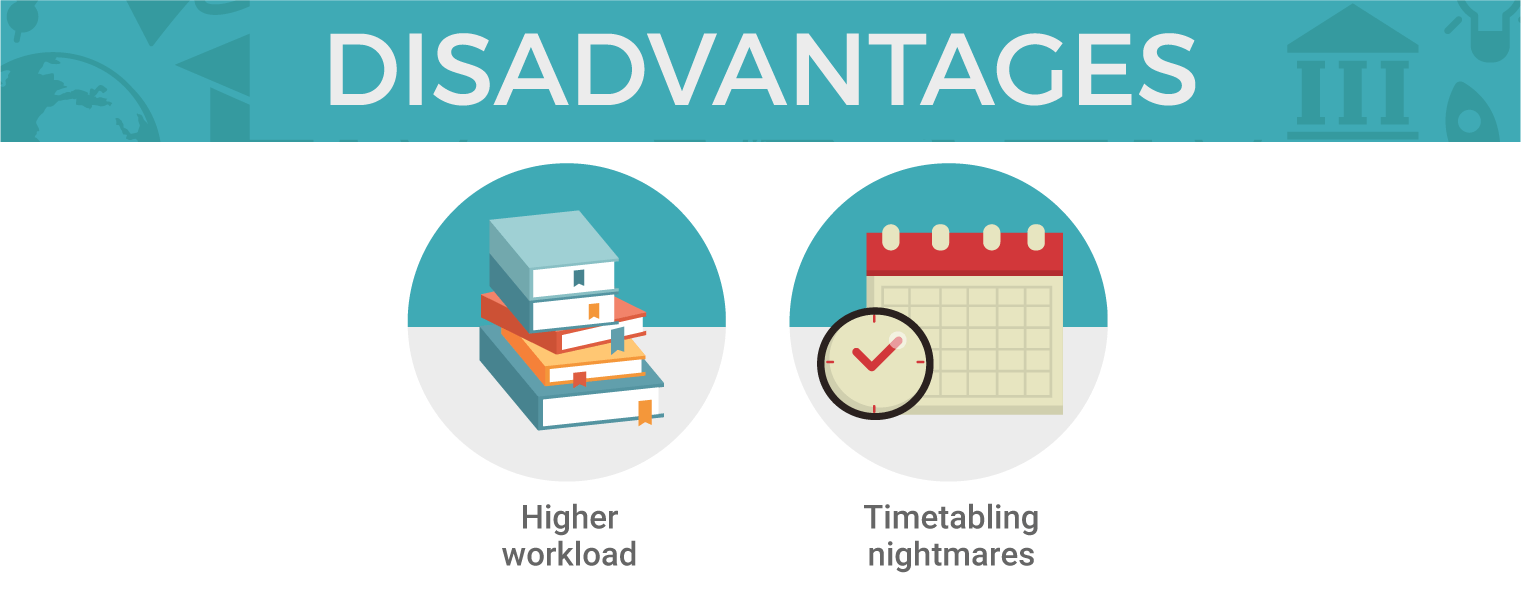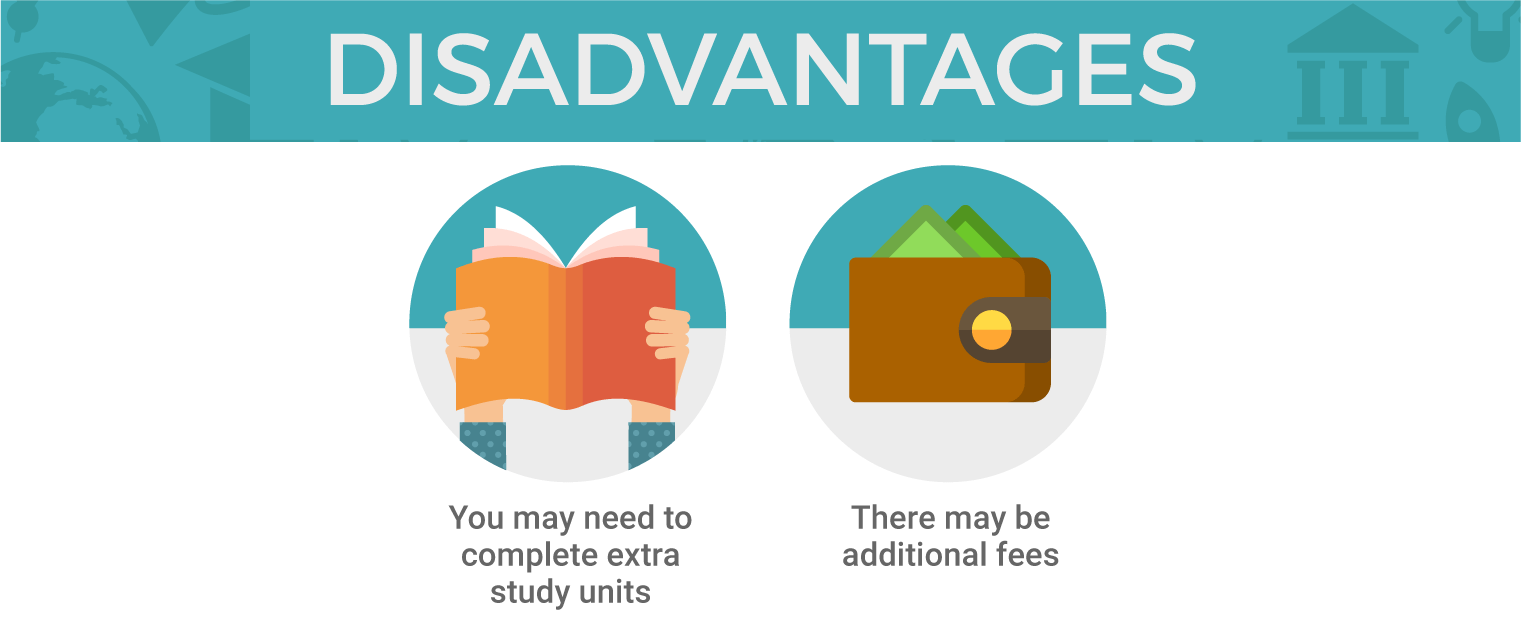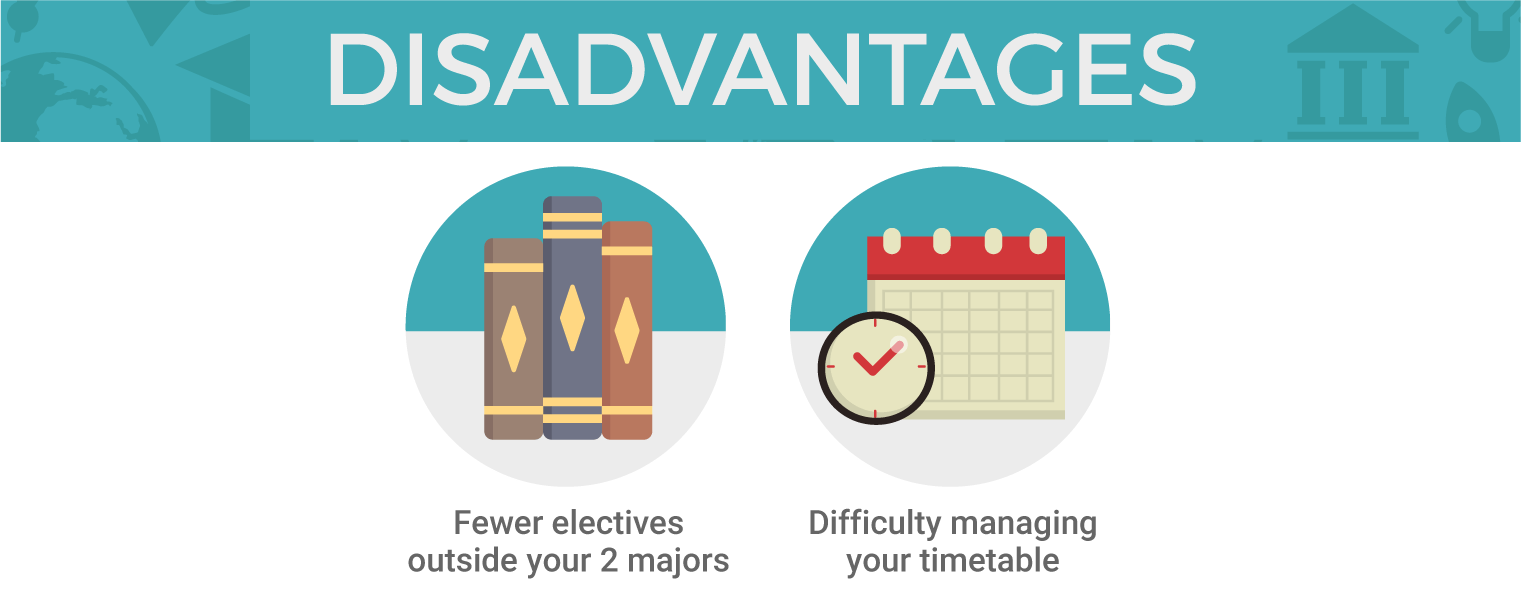Double Degree, Dual Award Degree and Double Major: How Do They Work and Are They Worth It?
Double majors. Double degrees. Dual award degrees. What do they mean?! Fret not because we’ve broken them down for you here.
Updated 21 Apr 2020

You may have been attracted by the terms double degree, dual award degree and double major when shopping for your tertiary education. After all, with a trigger word like “double”, surely these qualifications are worth twice the respect.
But do you know how they work and how they differ from one another? How much harder are they than single degrees? And are they worth the additional stress and sleepless nights?
In this article, we explore each of these degree types, along with the advantages and disadvantages so you can make an informed decision.
Double Degree

Of all the doubles in this list, a double degree is by far the hardest and the most impressive. This is because in a double degree, you will be studying 2 different degrees at the same time and graduate with 2 separate qualifications.
Studying a double degree allows you to complete 2 degrees in less time than if you were to do them separately. For instance, a Degree in Business and a Degree in Communication generally takes 3 years of study each. If you opt for a Double Degree in Business and Communication, you can complete it in as soon as 4 years.
Compared to single degree students, your total study hours in a double degree will be more, as can be seen from the longer programme duration. However, you will still be juggling the same number of subjects per semester as you would in a single degree.
Universities in Malaysia that offer double degrees are generally limited to Australian universities.
Advantages of a double degree

- Get more bang for your buck: Double degree programmes are cheaper than taking 2 single degrees on 2 separate occasions.
- Save yourself plenty of time: Depending on your chosen degrees, you may only need to complete 1-2 extra years of study to graduate with a double degree.
- Increase your job prospects: Double degree graduates are reportedly more likely to find work compared to single degree graduates. Also, as jobs become more multidisciplinary, having knowledge in 2 areas may be useful and increase your job prospects.
- Explore different areas of study: If you can’t decide between 2 fields of study, there’s no need to agonise over it — you can pursue both areas of interests!
Disadvantages of a double degree

- Higher workload: Pursuing 2 full-time degrees simultaneously can be demanding. You may find yourself having multiple assignments due at the same time, a hellish exam schedule and difficulty in juggling extra reading outside of classes.
- Timetabling nightmares: Since you’ll be taking subjects from 2 different faculties, scheduling your classes to avoid clashes can be harrowing. This can sometimes lead to postponing subjects and consequently, prolonging your graduation.
How to spot a double degree if it’s not stated clearly
“Double degree? Dual degree? Don’t they mean the same thing?”
Unfortunately, it’s not always so clear cut. Some institutions may use the term “double degree” to describe a dual award programme.
A programme is likely to be a double degree if...
- The word “Bachelor” appears twice in the degree name (e.g. Bachelor of Engineering (Honours) and Bachelor of Commerce); and
- The duration of the programme is at least 4 years; longer if one of the degrees is science-related; and
- The university offering the programme is from Australia (e.g. Monash University, Swinburne University of Technology), as it is less common for Malaysian universities to offer double degrees
A programme is not likely to be a double degree if…
- The word “Bachelor” only appears once and the fields of discipline are split with an “and” (e.g. Bachelor of Business (Management and Digital Media))
- The duration of the programme is only 3 years
- The university offering the programme is not from Australia

Dual Award Degree

Dual award degrees (sometimes called “dual degree” in Malaysia) are partnerships between 2 universities to offer a single jointly-delivered degree that leads to 2 separate certificates awarded by the 2 institutions.
Studying a dual award degree allows you to obtain 2 graduating certificates — 1 from a Malaysian institution and 1 from an overseas institution.
Compared to single award degree students, your total study hours may be slightly more, although they will still be significantly fewer than a double degree student.
Universities in Malaysia that offer dual award programmes often partner with foreign universities, such as institutions from Australia and the United Kingdom.
Advantages of a dual award degree

- Get 2 certificates — 1 local and 1 foreign: In addition to receiving double the number of certificates, the foreign qualification can be worth some bragging rights, especially if your partner institution is well-recognised.
- Save money on an overseas qualification: Get an overseas certification without leaving the country! You’ll save on tuition fees, living expenses and exchange rates.
- Complete part of your studies abroad: You’ll have the option of completing your final year of studies overseas with the partner university, exposing yourself to invaluable experiences like culture, language and lifestyle.
- Pursue your postgraduate studies abroad with ease: This is a great option if you’re planning to pursue your postgraduate studies abroad, especially if it’s at the same partner institution.
Disadvantages of a dual award degree

- You may need to complete extra study units: To meet the requirements of both awarding universities, you may need to work on extra modules compared to those who opt for single award degrees.
- There may be additional fees: Depending on the institution, the extra certificate may come with additional administrative and validation fees payable to the foreign university.
Apply for university with EduAdvisor
Secure scholarships and more when you apply to any of our 100+ partner universities.
Start nowHow to spot a dual award degree if it’s not stated clearly
In Malaysia, some universities may sometimes use the term “dual degree” or “double degree” to describe a dual award degree.
A programme is likely to be a dual award degree if...
- There are 2 university names listed as awarding institutions — 1 Malaysian university or university college (it’s important to note that it shouldn’t be a “college”) and 1 foreign university; and
- The programme duration is 3 years, or the normal period it takes to complete your degree
Double Major

When you specialise in a specific area of a degree (e.g. Finance or Accounting in a Business Degree), this is sometimes called a major (e.g. Bachelor of Business majoring in Finance).
Some universities allow you to major in 2 areas, which is called a double major. Studying a double major allows you to focus on 2 specialisations instead of just 1. This is done by utilising your elective subjects to build a second major. A double major can be in the same disciplinary field (e.g. Bachelor of Commerce majoring in Finance and Economics) or different disciplinary fields (e.g. Bachelor of Science majoring in Psychology and Communication).
Note that a double major is not the same as a double degree. In a double degree, you will graduate with 2 degrees while in a double major, you will only graduate with 1 degree.
In addition, your total study hours in a double major is usually the same as a single major. The key difference is that you’ll be spending less time on elective subjects.
In Malaysia, the concept of double major is generally used for degrees from Australian and American universities.
Advantages of a double major

- Pursue your interests: If you can’t decide between 2 areas of study, a double major enables you to pursue both fields without experiencing a heavier workload.
- Increase your employability: Thanks to your diverse knowledge and skills, a double major may help you stand out from a sea of single major graduates.
- Become a better thinker: A study suggests that students who major in 2 disciplines tend to think both integratively (i.e. able to make connections across different subjects and courses) and creatively.
Disadvantages of a double major

- Fewer electives outside your 2 majors: Concentrating on 2 areas will mean less flexibility for you to take “fun” electives outside of your chosen majors. So you’ll have to sacrifice subjects like Rock to Rave, Urban Legends and Korean 101.
- Difficulty managing your timetable: This is especially true if you are taking majors from 2 disciplinary fields, as you’ll need to organise your schedule and work with professors from different faculties.

How to spot a double major if it’s not stated clearly
Not all universities provide the option of taking double majors.
A programme is likely to be a double major if...
- The degree name uses the connector “and” to highlight 2 fields of study (e.g. Bachelor of Science (Communication and Psychology)); and
- The degree is awarded by an Australian or American university
A programme is not likely to be a double major if…
- The degree name uses the connector “with” (e.g. Theatre with Film), as this indicates a single major with a single minor
So there you have it! Now that you know what each programme entails, we hope that you’ll be able to make an informed decision when it comes to choosing your degree programme. While working on any type of degree may be challenging, know that your hard work will result in more open doors for you in the future!






